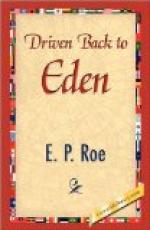“It’s plain enough,” continued Mr. Jones, “that old man Jamison was too poorly to take much care of things last year. You see, these red raspberries grow different from those black ones yonder. Those increase by the tips of the branches takin’ root; these by suckers. All these young shoots comin’ up between the rows are suckers, and they ought to be dug out. As I said before, you can set them out somewhere else if you want to. Dig ’em up, you know; make a trench in some out-of-the-way place, and bury the roots till you want ’em. Like enough the neighbors will buy some if they know you have ’em to spare. Only be sure to cut these long canes back to within six inches of the ground.”
“Yes,” I said, “that’s all just as I have read in the books.”
“So much the better for the books, then. I haven’t lived in this fruit-growin’ region all my life without gettin’ some ideas as to what’s what. I give my mind to farmin’; but Jamison and I were great cronies, and I used to be over here every day or two, and so it’s natural to keep comin’.”
“That’s my good luck.”
“Well, p’raps it’ll turn out so. Now Merton’s just the right age to help you in all this work. Jamison, you see, grew these raspberries in a continuous bushy row; that is, say, three good strong canes every eighteen inches apart in the row, and the rows five feet apart, so he could run a horse-cultivator between. Are you catchin’ on, Merton?”
“Yes, sir,” said the boy, with much interest.
“Well, all these suckers and extra plants that are swampin’ the ground are just as bad as weeds. Dig ’em all out, only don’t disturb the roots of the bearin’ canes you leave in the rows much.”
“How about trimming these?” I asked.
“Well, that depends. If you want early fruit, you’ll let ’em stand as they be; if you want big berries, you’ll cut ’em back one-third. Let me see. Here’s five rows of Highland Hardy; miserable poor-tastin’ kind; but they come so early that they often pay the best. Let them stand with their whole length of cane, and if you can scatter a good top-dressin’ of fine manure scraped up from the barnyard, you’ll make the berries larger. Those other rows of Cuthbert, Reliance, and Turner, cut back the canes one-third, and you’ll get a great deal more fruit than if you left more wood on ‘em. Cuttin’ back’ll make the berries big; and so they’ll bring as much, p’raps, as if they were early.”
“Well, Merton, this all accords with what I’ve read, only Mr. Jones makes it much clearer. I think we know how to go to work now, and surely there’s plenty to do.”
“Yes, indeed,” resumed Mr. Jones; “and you’ll soon find the work crowdin’ you. Now come to the big raspberry patch back of the barn, the patch where the canes are all laid down, as I told you. These are Hudson River Antwerps. Most people have gone out of ’em, but Jamison held on, and he was makin’ money on ’em. So may you. They are what we call tender, you see, and in November they must be bent down close to the ground and covered with earth, or else every cane would be dead from frost by spring. About the first week in April, if the weather’s mild, you must uncover ’em, and tie ’em to stakes durin’ the month.”




